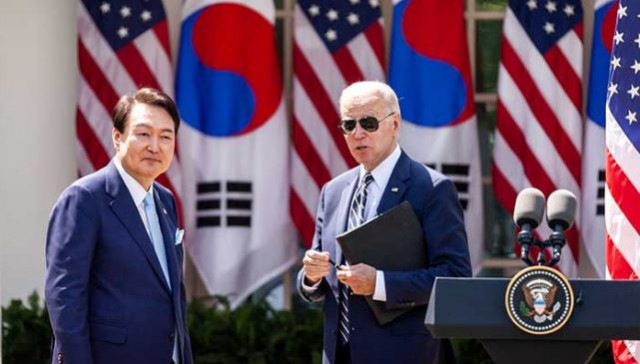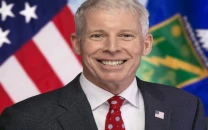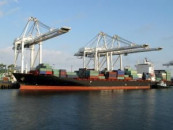US, South Korea to share nuclear planning to deter North Korean threat
Biden and I have agreed on steps to strengthen S. Korea's defenses in response to the threat posed by N. Korea: Yoon

The United States on Wednesday pledged to give South Korea more insight into its nuclear planning over any conflict with North Korea amid anxiety over Pyongyang's growing arsenal of missiles and bombs.
The announcement, which included a renewed pledge by Seoul not to pursue a nuclear bomb of its own, emerged from White House talks between US President Joe Biden and South Korean leader Yoon Suk Yeol that covered issues including North Korea, semiconductor chips and trade, and the Ukraine war.
At a joint news conference, Yoon said he and Biden had agreed on steps to strengthen South Korea's defenses in response to the threat posed by North Korea.
"Our two countries have agreed to immediate bilateral presidential consultations in the event of North Korea's nuclear attack and promised to respond swiftly, overwhelmingly and decisively using the full force of the alliance, including the United States' nuclear weapons," Yoon said.
Biden reiterated the US offer to North Korea to hold talks over its nuclear and missile programs, which has been ignored by North Korean leader Kim Jong Un.
North Korea’s mission to the United Nations did not respond to a request for comment.
Deterring North Korea
North Korea's rapidly advancing weapons programs — including ballistic missiles that can reach US cities — have raised questions about whether Washington would really use its nuclear weapons to defend South Korea under what it calls "extended deterrence."
Opinion polls in South Korea show a majority want Seoul to acquire its own nuclear bombs, a step Washington opposes.
Under a new "Washington Declaration," the US will give Seoul detailed insights into, and a voice in, US contingency planning to deter and respond to any nuclear incident in the region through a US-ROK Nuclear Consultative Group, US officials said.
Washington will also deploy a ballistic-missile submarine to South Korea in a show of force, the first such submarine visit since the 1980s, US officials said.
But Biden made clear that no US nuclear weapons would be stationed on South Korean territory.
Also read: Sound of air strikes echoes in Khartoum as US pushes for longer truce
"I have absolute authority as commander in chief and the sole authority to use a nuclear weapon, but … what the declaration means is that we're going to make every effort to consult with our allies when it's appropriate, if any action is so called for," he said.
Yoon's is only the second state visit Biden has hosted since taking office two years ago — the first such guest was France's president.
Biden and Yoon also discussed tensions between China and Taiwan and Chinese military activities in the South China Sea.
In a joint statement, the two presidents stressed the importance of preserving stability in the Taiwan Strait.
They also strongly opposed "any unilateral attempts to change the status quo in the Indo-Pacific, including through unlawful maritime claims, the militarization of reclaimed features, and coercive activities," it said.
The US planned to brief China on the steps with Seoul, US officials said, signaling a desire to ease tense relations.



















COMMENTS
Comments are moderated and generally will be posted if they are on-topic and not abusive.
For more information, please see our Comments FAQ